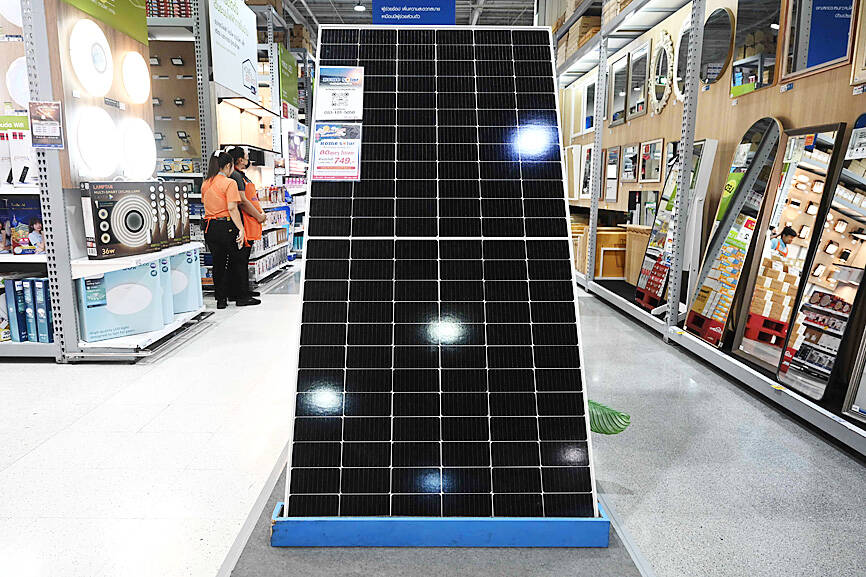The US on Monday announced its intention to impose tariffs of up to 3,521 percent on solar panels from Southeast Asia, a move aimed at countering alleged Chinese subsidies and dumping in the sector.
The tariffs on companies from Cambodia, Thailand, Malaysia and Vietnam would still need to be ratified at a meeting of the US International Trade Commission in June.
The decision unveiled comes after anti-dumping and countervailing duty (CVD) investigations were filed about a year ago by several US and other solar manufacturers.

Photo: AFP
The companies took aim at “unfair practices” that were said to have weighed on the US domestic solar market, particularly raising concern over Chinese-headquartered companies operating out of Southeast Asian countries.
While Monday’s move came after a year-long investigation, it follows on the heels of US President Donald Trump launching blistering trade wars through tariffs around the globe.
Trump’s tariffs, which have seen the White House impose high levies before suspending some of them to allow for negotiations, are aimed at reducing US trade imbalances.
However, the US Department of Commerce’s statement said the new recommended tariffs on solar cells were taking specific aim at “transnational subsidies.”
“In the CVD investigations involving Cambodia, Malaysia, Thailand and Vietnam, [the department] found that companies in each country were receiving subsidies from the government of China,” the statement said. “These are among the first CVD investigations wherein [the department] has made an affirmative finding that companies received transnational subsidies.”
The case was brought by Hanwha Qcells Co, First Solar Inc, Convalt Energy Inc and others.
For the duties to be finalized, the US International Trade Commission has until early June to make a final determination.
Among firms targeted were Chinese companies Jinko Solar Co (晶科能源) and Trina Solar Ltd (天合光能).
Products from Cambodia are set to face duties of up to 3,521 percent, the commerce department said.
Jinko Solar faced duties of 40 percent for exports from Malaysia and about 245 percent for goods from Vietnam.
Trina Solar in Thailand would see duties of more than 375 percent, and more than 200 percent for products from Vietnam.
If imposed, the new levies would come on top of the blanket 10 percent tariff imposed by Trump since early this month on products entering the US from most trading partners.
In 2023, the US imported US$11.9 billion in solar cells from the countries named in the latest action, official data showed.

Merida Industry Co (美利達) has seen signs of recovery in the US and European markets this year, as customers are gradually depleting their inventories, the bicycle maker told shareholders yesterday. Given robust growth in new orders at its Taiwanese factory, coupled with its subsidiaries’ improving performance, Merida said it remains confident about the bicycle market’s prospects and expects steady growth in its core business this year. CAUTION ON CHINA However, the company must handle the Chinese market with great caution, as sales of road bikes there have declined significantly, affecting its revenue and profitability, Merida said in a statement, adding that it would

MARKET LEADERSHIP: Investors are flocking to Nvidia, drawn by the company’s long-term fundamntals, dominant position in the AI sector, and pricing and margin power Two years after Nvidia Corp made history by becoming the first chipmaker to achieve a US$1 trillion market capitalization, an even more remarkable milestone is within its grasp: becoming the first company to reach US$4 trillion. After the emergence of China’s DeepSeek (深度求索) sent the stock plunging earlier this year and stoked concerns that outlays on artificial intelligence (AI) infrastructure were set to slow, Nvidia shares have rallied back to a record. The company’s biggest customers remain full steam ahead on spending, much of which is flowing to its computing systems. Microsoft Corp, Meta Platforms Inc, Amazon.com Inc and Alphabet Inc are

RISING: Strong exports, and life insurance companies’ efforts to manage currency risks indicates the NT dollar would eventually pass the 29 level, an expert said The New Taiwan dollar yesterday rallied to its strongest in three years amid inflows to the nation’s stock market and broad-based weakness in the US dollar. Exporter sales of the US currency and a repatriation of funds from local asset managers also played a role, said two traders, who asked not to be identified as they were not authorized to speak publicly. State-owned banks were seen buying the greenback yesterday, but only at a moderate scale, the traders said. The local currency gained 0.77 percent, outperforming almost all of its Asian peers, to close at NT$29.165 per US dollar in Taipei trading yesterday. The

The US overtaking China as Taiwan’s top export destination could boost industrial development and wage growth, given the US is a high-income economy, an economist said yesterday. However, Taiwan still needs to diversify its export markets due to the unpredictability of US President Donald Trump’s administration, said Chiou Jiunn-rong (邱俊榮), an economics professor at National Central University. Taiwan’s exports soared to a record US$51.74 billion last month, driven by strong demand for artificial intelligence (AI) products and continued orders, with information and communication technology (ICT) and audio/video products leading all sectors. The US reclaimed its position as Taiwan’s top export market, accounting for